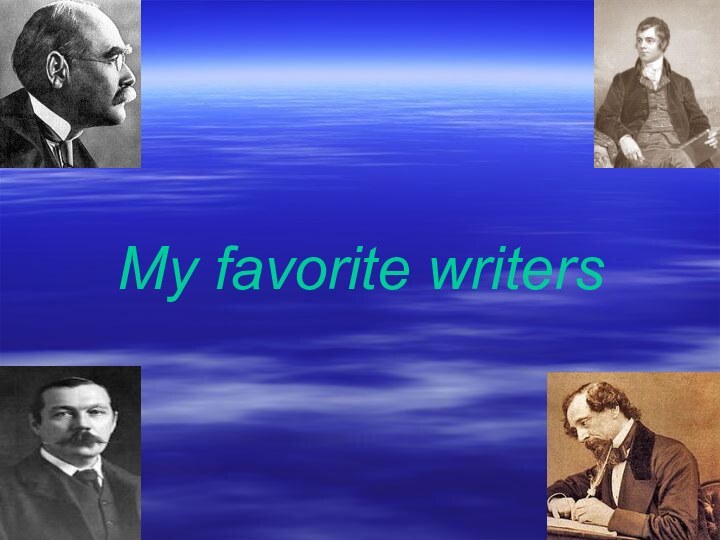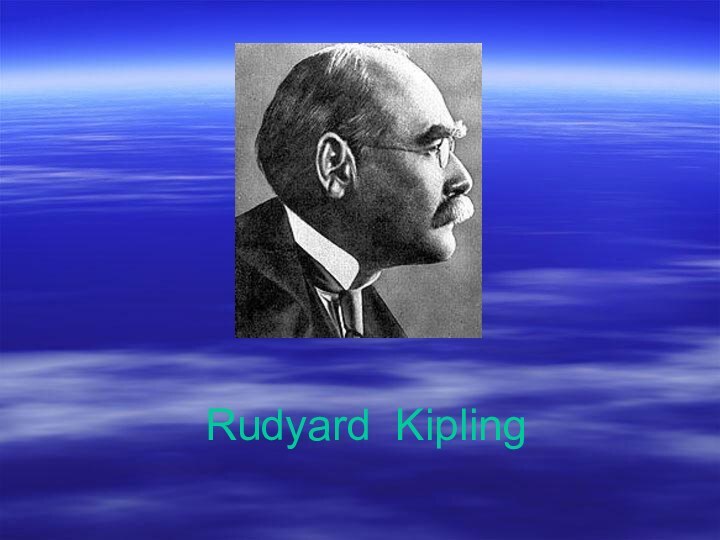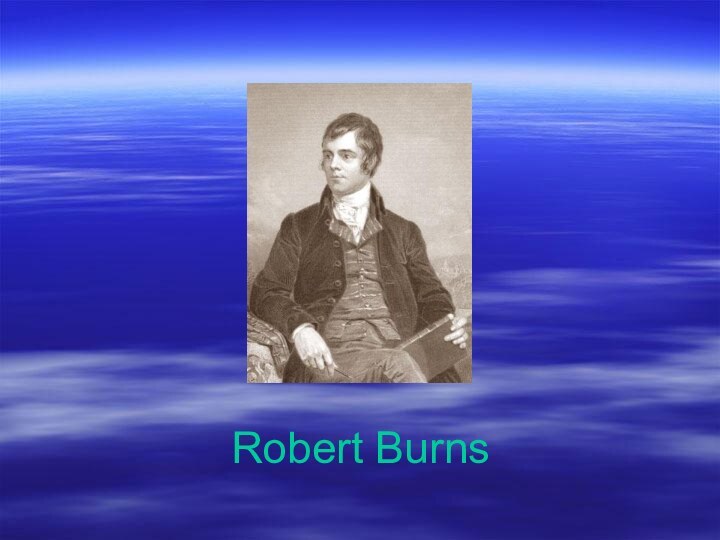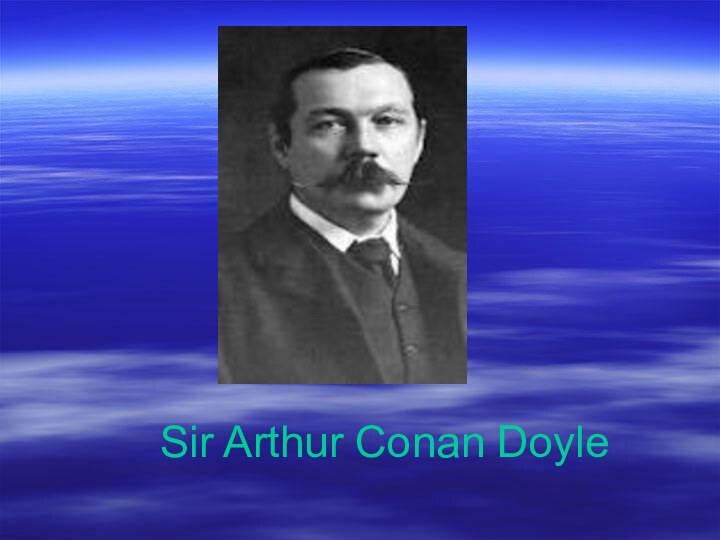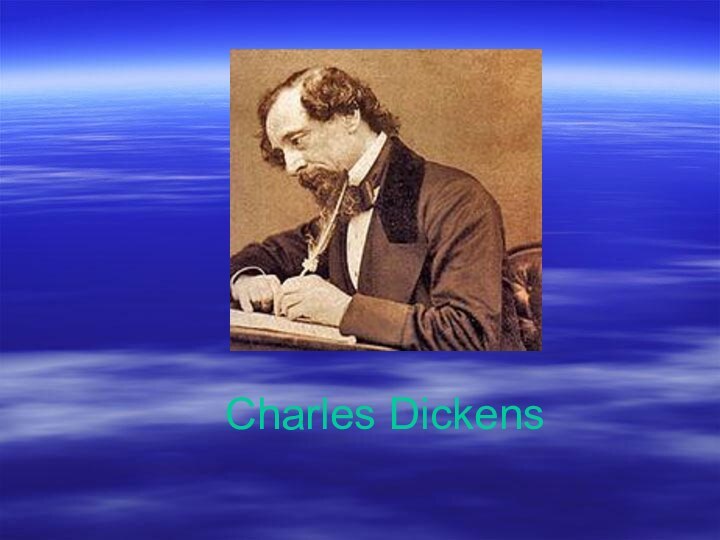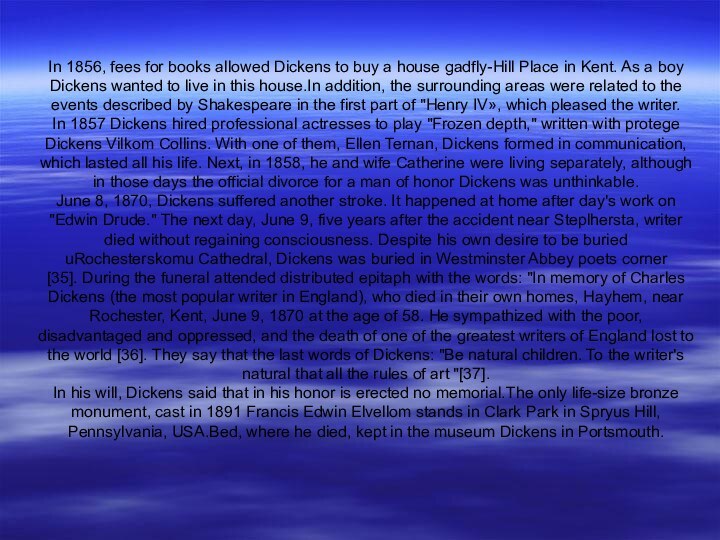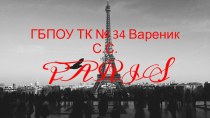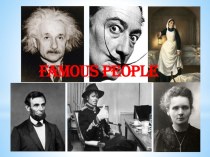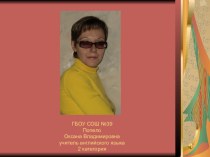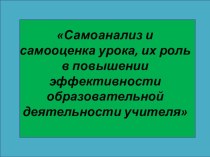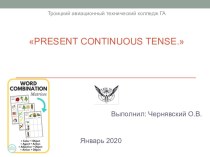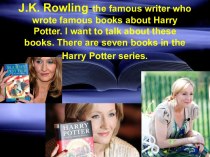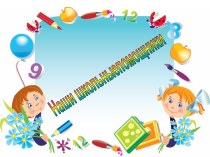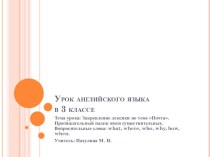Слайд 3
Kipling was born in Bombay. His second name it
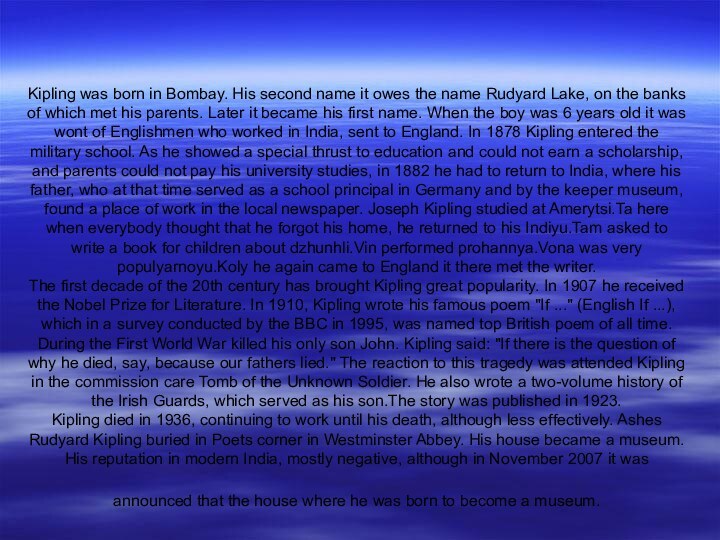
owes the name Rudyard Lake, on the banks of
which met his parents. Later it became his first name. When the boy was 6 years old it was wont of Englishmen who worked in India, sent to England. In 1878 Kipling entered the military school. As he showed a special thrust to education and could not earn a scholarship, and parents could not pay his university studies, in 1882 he had to return to India, where his father, who at that time served as a school principal in Germany and by the keeper museum, found a place of work in the local newspaper. Joseph Kipling studied at Amerytsi.Ta here when everybody thought that he forgot his home, he returned to his Indiyu.Tam asked to write a book for children about dzhunhli.Vin performed prohannya.Vona was very populyarnoyu.Koly he again came to England it there met the writer.
The first decade of the 20th century has brought Kipling great popularity. In 1907 he received the Nobel Prize for Literature. In 1910, Kipling wrote his famous poem "If ..." (English If ...), which in a survey conducted by the BBC in 1995, was named top British poem of all time.
During the First World War killed his only son John. Kipling said: "If there is the question of why he died, say, because our fathers lied." The reaction to this tragedy was attended Kipling in the commission care Tomb of the Unknown Soldier. He also wrote a two-volume history of the Irish Guards, which served as his son.The story was published in 1923.
Kipling died in 1936, continuing to work until his death, although less effectively. Ashes Rudyard Kipling buried in Poets corner in Westminster Abbey. His house became a museum.
His reputation in modern India, mostly negative, although in November 2007 it was announced that the house where he was born to become a museum.
Слайд 5
Born into a family farmer-tenant William Burns.
Robert and
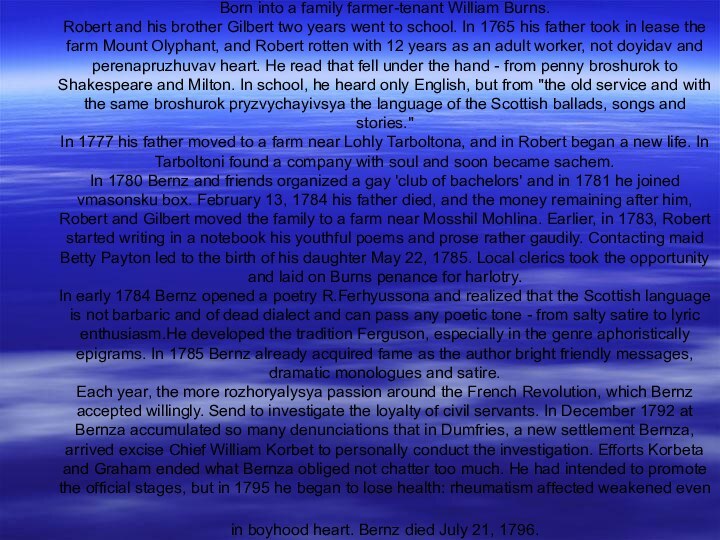
his brother Gilbert two years went to school. In 1765
his father took in lease the farm Mount Olyphant, and Robert rotten with 12 years as an adult worker, not doyidav and perenapruzhuvav heart. He read that fell under the hand - from penny broshurok to Shakespeare and Milton. In school, he heard only English, but from "the old service and with the same broshurok pryzvychayivsya the language of the Scottish ballads, songs and stories."
In 1777 his father moved to a farm near Lohly Tarboltona, and in Robert began a new life. In Tarboltoni found a company with soul and soon became sachem.
In 1780 Bernz and friends organized a gay 'club of bachelors' and in 1781 he joined vmasonsku box. February 13, 1784 his father died, and the money remaining after him, Robert and Gilbert moved the family to a farm near Mosshil Mohlina. Earlier, in 1783, Robert started writing in a notebook his youthful poems and prose rather gaudily. Contacting maid Betty Payton led to the birth of his daughter May 22, 1785. Local clerics took the opportunity and laid on Burns penance for harlotry.
In early 1784 Bernz opened a poetry R.Ferhyussona and realized that the Scottish language is not barbaric and of dead dialect and can pass any poetic tone - from salty satire to lyric enthusiasm.He developed the tradition Ferguson, especially in the genre aphoristically epigrams. In 1785 Bernz already acquired fame as the author bright friendly messages, dramatic monologues and satire.
Each year, the more rozhoryalysya passion around the French Revolution, which Bernz accepted willingly. Send to investigate the loyalty of civil servants. In December 1792 at Bernza accumulated so many denunciations that in Dumfries, a new settlement Bernza, arrived excise Chief William Korbet to personally conduct the investigation. Efforts Korbeta and Graham ended what Bernza obliged not chatter too much. He had intended to promote the official stages, but in 1795 he began to lose health: rheumatism affected weakened even in boyhood heart. Bernz died July 21, 1796.
Слайд 7
Sir Arthur Conan Doyle was born May 22,
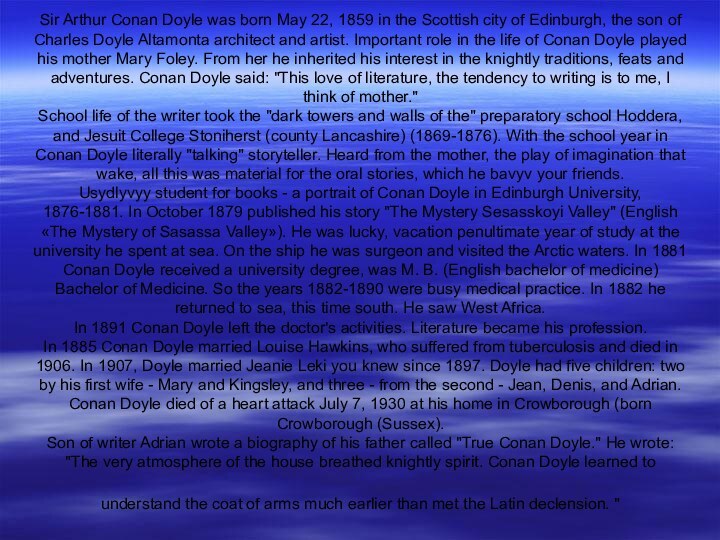
1859 in the Scottish city of Edinburgh, the son
of Charles Doyle Altamonta architect and artist. Important role in the life of Conan Doyle played his mother Mary Foley. From her he inherited his interest in the knightly traditions, feats and adventures. Conan Doyle said: "This love of literature, the tendency to writing is to me, I think of mother."
School life of the writer took the "dark towers and walls of the" preparatory school Hoddera, and Jesuit College Stoniherst (county Lancashire) (1869-1876). With the school year in Conan Doyle literally "talking" storyteller. Heard from the mother, the play of imagination that wake, all this was material for the oral stories, which he bavyv your friends.
Usydlyvyy student for books - a portrait of Conan Doyle in Edinburgh University, 1876-1881. In October 1879 published his story "The Mystery Sesasskoyi Valley" (English «The Mystery of Sasassa Valley»). He was lucky, vacation penultimate year of study at the university he spent at sea. On the ship he was surgeon and visited the Arctic waters. In 1881 Conan Doyle received a university degree, was M. B. (English bachelor of medicine) Bachelor of Medicine. So the years 1882-1890 were busy medical practice. In 1882 he returned to sea, this time south. He saw West Africa.
In 1891 Conan Doyle left the doctor's activities. Literature became his profession.
In 1885 Conan Doyle married Louise Hawkins, who suffered from tuberculosis and died in 1906. In 1907, Doyle married Jeanie Leki you knew since 1897. Doyle had five children: two by his first wife - Mary and Kingsley, and three - from the second - Jean, Denis, and Adrian.
Conan Doyle died of a heart attack July 7, 1930 at his home in Crowborough (born Crowborough (Sussex).
Son of writer Adrian wrote a biography of his father called "True Conan Doyle." He wrote: "The very atmosphere of the house breathed knightly spirit. Conan Doyle learned to understand the coat of arms much earlier than met the Latin declension. "
Слайд 9
Charles Dickens was born in a suburb of
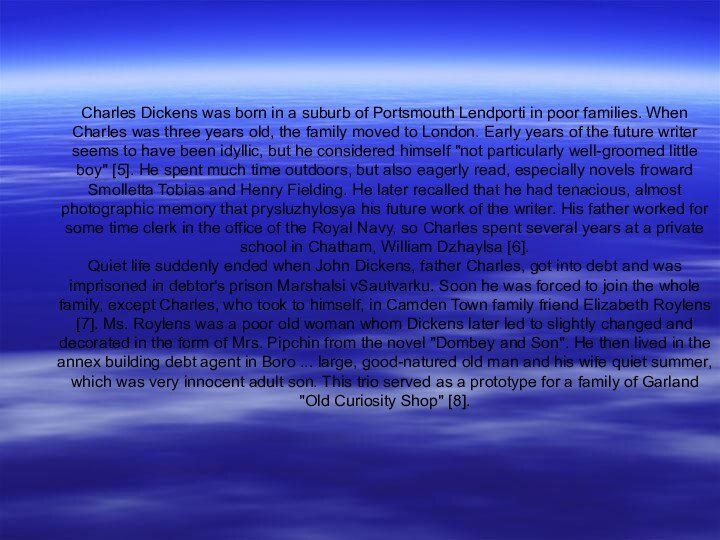
Portsmouth Lendporti in poor families. When Charles was three years
old, the family moved to London. Early years of the future writer seems to have been idyllic, but he considered himself "not particularly well-groomed little boy" [5]. He spent much time outdoors, but also eagerly read, especially novels froward Smolletta Tobias and Henry Fielding. He later recalled that he had tenacious, almost photographic memory that prysluzhylosya his future work of the writer. His father worked for some time clerk in the office of the Royal Navy, so Charles spent several years at a private school in Chatham, William Dzhaylsa [6].
Quiet life suddenly ended when John Dickens, father Charles, got into debt and was imprisoned in debtor's prison Marshalsi vSautvarku. Soon he was forced to join the whole family, except Charles, who took to himself, in Camden Town family friend Elizabeth Roylens [7]. Ms. Roylens was a poor old woman whom Dickens later led to slightly changed and decorated in the form of Mrs. Pipchin from the novel "Dombey and Son". He then lived in the annex building debt agent in Boro ... large, good-natured old man and his wife quiet summer, which was very innocent adult son. This trio served as a prototype for a family of Garland "Old Curiosity Shop" [8].
